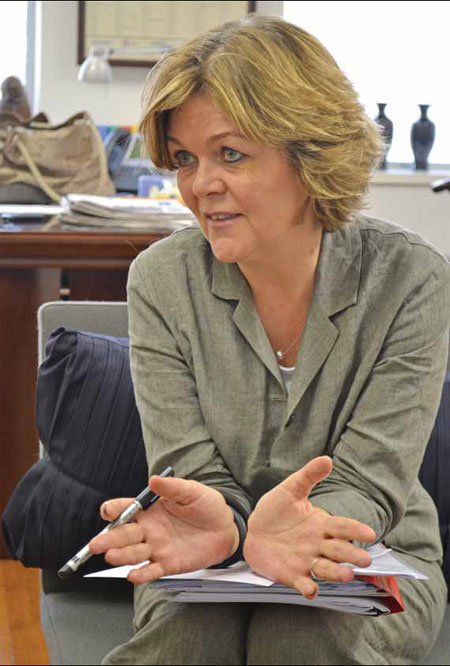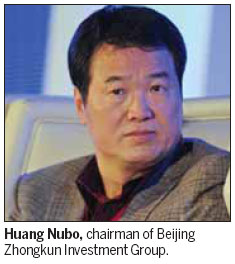Tycoon inches closer to Iceland deal
Updated: 2012-05-11 11:46
By Todd Balazovic (China Daily European Weekly)
|
|||||||||||
Huang confident nature resort project will clear last government hurdle soon
|
 Iceland ambassador Kristin Arnadottir says Zhongkun Group sees opportunities in her country. [Todd Balazovic / China Daily] |
A dream by a Chinese real estate magnate to own a piece of Icelandic wilderness has moved one step closer to reality after officials accepted an application to lease the land.
Plans to develop a large swath of Iceland's coast into a nature resort by Huang Nubo, chairman of real estate firm Beijing Zhongkun Investment Group, were given the initial go ahead after a special committee, set up by the Icelandic government to review the application, presented its report on May 4.
But, despite several media reports saying Huang's offer had been accepted, the recommendation does not mean that the investment has been approved, ministry of industry, energy and tourism spokesman Thorir Hrafnsson says.
 |
Huang initially sought to purchase 30,000 hectares of land in Iceland's northeastern Grimsstadir a Fjoellumland region for 1 billion Icelandic kronur ($8.8 million, 6.2 million euros).
The Iceland government rejected the offer as it did not meet the legal requirements for foreign land ownership in the country.
The new offer to lease a significantly smaller 300 hectare plot of land for a period of 40 to 99 years went through the first stage of approval, after a panel representing Iceland's ministries of economy, finance and industry presented a report recommending the government accept the deal.
"Individuals from outside the European Economic Area have been granted exemptions to acquire and control real estate in Iceland, but land for foreign direct investment projects has usually been leased," Iceland's Ambassador to China, Kristin Arnadottir, tells China Daily.
She says the previous offer to purchase such a large area - the original bid would have seen Zhongkun owning roughly 0.3 percent of Iceland's total landmass, 30 percent of which is owned by the Ministry of Agriculture - was a point of contention among Icelanders.
"Zhongkun's investment proposal has been debated in Iceland. There are pros and cons about the project, but the debate is mainly focused on the ownership of the land - a big area of land," she says.
While some have reservations about selling a large area of land to a foreign enterprise, others see the investment as a strong boost for Iceland's struggling economy.
With an initial plan to invest $200 million (155 million euros), Huang's ambitions to build luxurious hotels, highland parks and resorts are being viewed as an opportunity to evolve the tourism industry for the small Nordic nation, as well as help inject some money in to the country which was hit hard by the 2008 banking crash.
"Zhongkun has presented itself in Iceland as a very ambitious company with good values and vision, seeing opportunities that others might not find in Iceland," Arnadottir says.
China is expected to become the world's No 1 source of international tourists by 2012 with roughly 80 million Chinese tourists expected to go abroad in 2012, worth a potential $70 billion, according to statistics from the China Outbound Travel Research Institute. The deal could mean locking in a major source of income for the nation of just 320,000 people.
Iceland is already starting to see the trickle-down effect of China's global tourism reach.
"Tourism from China increased by 70 percent last year, the largest increase by any single nationality visiting Iceland last year," Arnadottir says.
And as Iceland sees an increasing number of Chinese tourists, there is room for growth in the hospitality and recreation sectors, she says.
"Iceland presents many fantastic opportunities for investors because there is a shortage in supply of hotels and resorts during the peak season for tourism."
Though the investment could be beneficial for both parties, there are still several steps to go before Zhongkun can lock in the land deal.
Before any official bid can be made, Zhongkun must establish its Iceland-based operation - Zhongkun Grimsstadir - in order to enter into contract negotiations with the Icelandic minister of industry, the ministry's spokesman Hrafnsson says.
Only then will the official process of leasing the land begin.
Still, Huang seems confident the deal will go through.
In an exclusive interview with China Daily on May 4, he said he expected to sign the lease for the land in mid-June.
"The Icelandic officials and residents know the significance of my investment, and they know it sends out messages of Iceland's attitude towards foreign investment," Huang said.
Huang has had a long interest in Iceland, stemming from his time studying at Peking University, where he roomed with Icelandic translator Hjorleifur Sveinbjornsson in the 1970s.
In 2010, Huang invested $1 million to establish the Iceland-China Cultural Fund. Calling the vast wild expanses of Iceland an inspiration for his poetry, Huang set up the fund to establish the Sino-Icelandic Poetry festival, which will be held for the third time in October.
His former university roommate, Sveinbjornsson, is the chairman of the fund.
While he may hold a fondness for the cold Nordic nation, Huang was visibly chafed by the initial rejection to his offer to purchase the land and was quoted in the media as calling the move "anti-Chinese".
"I did nothing but wait after the rejection," he said. "But finally my patience is paying off."
Following the re-working of the deal, his attitude toward Iceland seems to have warmed.
"They've been working hard to find a way of making the plan possible," he said in the interview.
While tourism is currently at the forefront of Sino-Icelandic relations, it is not the only topic of discussion.
In late April, Premier Wen Jiabao paid a two-day visit to Iceland to cement bilateral ties between the two countries.
It was first official visit by a Chinese Premier in the 41 years since diplomatic relations were established.
During the visit, Wen discussed several areas of collaboration with Iceland President Olafur Ragnar Grimsson, ranging from education to scientific research.
toddbalazovic@chinadaily.com.cn
Today's Top News
Rescuers race against time for quake victims
Telecom workers restore links
Coal mine blast kills 18 in Jilin
Intl scholarship puts China on the map
More bird flu patients discharged
Gold loses sheen, but still a safe bet
US 'turns blind eye to human rights'
Telecom workers restore links
Hot Topics
Lunar probe , China growth forecasts, Emission rules get tougher, China seen through 'colored lens', International board,
Editor's Picks

|

|

|

|

|

|





